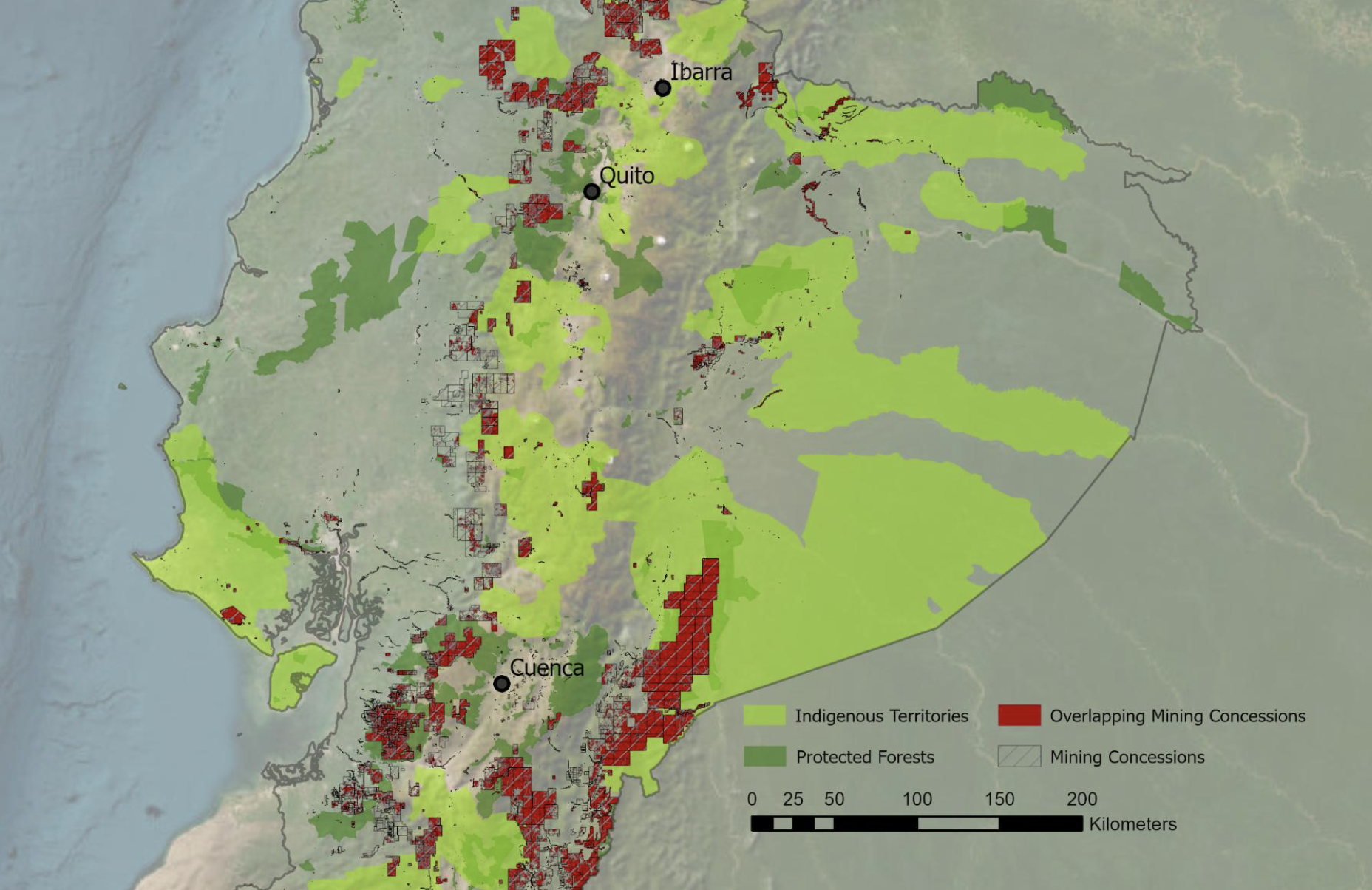ENGLISH: In an unprecedented case the Constitutional Court of Ecuador used the constitutional provision on the “Rights of Nature” to safeguard Los Cedros protected forest from mining concessions. The Court voted 7 in favor and 2 abstentions.
With the ruling, the Constitutional Court must develop a binding jurisprudence in which the Rights of Nature, the right to a healthy environment, the right to water, and environmental consultation must be respected.
The court decided that activities that threaten the Rights of Nature should not be carried out within the Los Cedros Protected Forest ecosystem, which includes mining and all types of extractive activities. Water and environmental permits to mining companies must also be denied.
Two-thirds of the reserve is covered by mining concessions granted to the Ecuadorian state mining company ENAMI and its Canadian partner, Cornerstone Capital Resources. The Constitutional Court agreed in May 2020 to hear the case.
Earth Law Center, Global Alliance for the Rights of Nature, and the Center for Biological Diversity filed an amicus curiae (friend of the court) brief in September 2020 before the Ecuadorian Constitutional Court. It asked the court to protect Los Cedros and robustly enforce constitutional provisions that establish basic Rights of Nature, or “Pachamama,” including the rights to existing, to restoration, and the rights of the rivers, especially river Magdalena.
“This is a historic victory in favor of Nature. The Constitutional Court states that no activity that threatens the Rights of Nature can be developed within the ecosystem of Los Cedros Protected Forest, including mining and any other extractive activity. Mining is now banned from this amazing and unique protected forest. This sets a great juridical precedent to continue with other threatened Protected Forests. Today, the endangered frogs, the spectacled bears, the spider monkey, the birds, and Nature as a whole have won an unprecedented battle”, says Natalia Greene, from the Global Alliance for the Rights of Nature.
The brown-headed spider monkey, found in Los Cedros, has lost more than 80% of its original area of distribution in northwest Ecuador. In 2005 it was estimated that there were fewer than 250 brown-headed spider monkeys globally, granting the species a place among the top 25 most endangered primates in the world.
The groups note that the case is of great significance, both for Ecuador and the world, because it has the potential to establish important and influential “Earth jurisprudence” that will help guide humanity to be a benefit rather than a destructive presence within the community of life. The proposed mining is unlawful, the groups say, it violates the rights of the Los Cedros Protective Forest as an ecosystem as well as the rights of the many members of that living community.
Download the press release in English here.
Translation now available here.
ESPAÑOL: La Corte Constitucional de Ecuador hace valer los “Derechos de la Naturaleza” constitucionales para salvaguardar el Bosque Protector Los Cedros

En un caso sin precedentes, la Corte Constitucional de Ecuador utilizó la disposición constitucional sobre los “Derechos de la Naturaleza” para salvaguardar el Bosque Protector Los Cedros de las concesiones mineras. El Tribunal votó 7 a favor y 2 abstenciones.
A raíz de la decisión, que fue publicada el 1 de diciembre, la Corte Constitucional desarrollará una regla vinculante en la que se deben respetar los Derechos de la Naturaleza, el derecho a un medio ambiente sano, el derecho al agua y la consulta ambiental
La Corte decidió que las actividades que atentan contra los derechos de la naturaleza no deben realizarse dentro del ecosistema del Bosque Protector Los Cedros. El fallo prohíbe la minería y todo tipo de actividades extractivas en el área. También se deben negar los permisos de agua y ambientales a las empresas mineras.
Se han otorgado concesiones mineras a dos tercios del increíble bosque Los Cedros. La minera estatal ecuatoriana ENAMI y su socio canadiense, Cornerstone Capital Resources, tiene los derechos. El nuevo fallo significa que se deben cancelar las concesiones mineras, los permisos ambientales y de agua en el bosque.
Earth Law Center, la Alianza Global por los Derechos de la Naturaleza (Global Alliance for the Rights of Nature), y el Centro para la Diversidad Biológica presentaron un amicus curiae en septiembre de 2020 ante la Corte Constitucional de Ecuador. Pidieron al tribunal que protegiera Los Cedros y que aplicara con firmeza las disposiciones constitucionales que establecen los Derechos básicos de la Naturaleza, o “Pachamama”, incluidos los derechos a la existencia, a la restauración y los derechos de los ríos, especialmente el río Magdalena.
“Esta es una victoria histórica a favor de la Naturaleza. El Tribunal Constitucional establece que ninguna actividad que amenace los Derechos de la Naturaleza puede desarrollarse dentro del ecosistema del Bosque Protector Los Cedros, incluyendo la minería y cualquier otra actividad extractiva. La minería está ahora prohibida en este increíble y único bosque protegido. Esto sienta un gran precedente jurídico para continuar con otros Bosques Protectores amenazados. Hoy, las ranas en peligro de extinción, los osos de anteojos, el mono araña, las aves y la naturaleza en su conjunto han ganado una batalla sin precedentes”, declaró Natalia Greene, de la Alianza Global por los Derechos de la Naturaleza.
El mono araña de cabeza marrón, que se encuentra en Los Cedros, ha perdido más del 80% de su área de distribución original en el noroeste de Ecuador. En 2005 se estimó que había menos de 250 monos araña de cabeza marrón en todo el mundo, lo que le otorgó a la especie un lugar entre los 25 primates más amenazados del mundo.
Los grupos señalaron que el caso es de gran importancia, tanto para Ecuador como para el mundo, porque tiene el potencial de establecer una importante e influyente “jurisprudencia de la Tierra” que ayudará a guiar a la humanidad para que sea un beneficio y no una presencia destructiva dentro de la comunidad de la vida. La minería que se ha propuesto es ilegal, según los grupos, además de violar los derechos del Bosque Protector Los Cedros como ecosistema, y los derechos de muchos de los miembros de esa comunidad de vida.
Descarga el comunicado de prensa en español aquí.
Descarga la sentencia de la Corte aquí.




